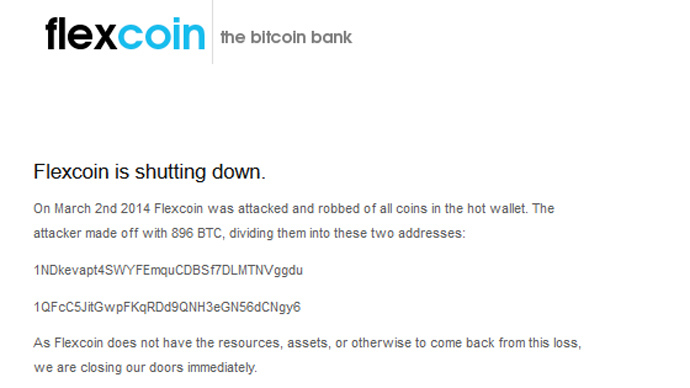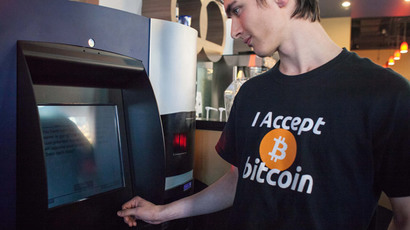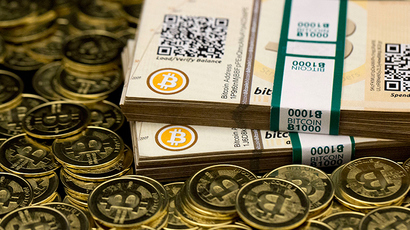Bitcoin bank folds after hacker robbery

Bitcoin storage site Flexcoin announced Tuesday that it has closed after hackers robbed it of some $600,000 worth of digital currency.
“On March 2nd 2014 Flexcoin was attacked and robbed of all coins in the hot wallet. The attacker made off with 896 BTC,” the bitcoin bank said on its website. “As Flexcoin does not have the resources, assets, or otherwise to come back from this loss, we are closing our doors immediately.”
The stolen 896 bitcoins come to a loss of around US$600,000, depending on current bitcoin trading value. Bitcoin is not backed by deposit insurance since it is a cryptocurrency.
Flexcoin kept bitcoins offline, or in “cold storage,” to remain secure. Cold storage is separate from a hot wallet, or a bitcoin wallet which is online and connected to the internet.
“When you send a bitcoin, it will only be accessible on the computer it is sent to, and nowhere else,” the bank’s site explains. “Flexcoin acts as a centralized location to store all of your bitcoins, so that you can send them anywhere from any web connected device. It eliminates the need to be connected to the PC you originally received the bitcoin on.”
Flexcoin’s demise comes days after the world’s largest bitcoin exchange folded.
Last week, Mt Gox filed for bankruptcy in a Tokyo district court after the exchange's computer system was exposed to fraudulent transactions and technical failures. A leaked internal Mt Gox “crisis strategy” document suggested that the exchange site had been hacked and hundreds of millions of dollars worth of the stolen cryptocurrency began to circulate online.
Mt Gox once claimed to host nearly 80 percent of all bitcoin transactions worldwide, and was the primary source cited for bitcoin prices. Its failure wiped out six percent of the currency’s total circulation, AP reported.
After Mt Gox crashed on Feb. 24, the value of bitcoin fell to $440 – a three-month low after the currency reached highs above $1,000 at the end of November.
The dual failures are raising questions about the future of bitcoin as an alternative currency.
The Japanese government will clarify its position on bitcoin transactions and how they should operate under current law, inside sources told Reuters on Tuesday.
A decision will be made at a Friday cabinet meeting, though Japan will not consider bitcoin as a currency.
Central banks across the globe have begun to crack down on the cryptocurrency, instructing financial institutions not to accept bitcoin because it has no legal status or monetary backing, unlike state-backed currencies.
Supporters say the distributed, anonymous, and decentralized bitcoin is a way to evade large banks and payment processors that make billions of dollars each year as financial go-betweens, among other uses.














